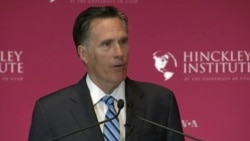The Conservative Political Action Conference in the United States is not a place to find supporters of Democratic presidential candidate Hillary Clinton, but many Republican activists appear to find her preferable to Donald Trump, their own party's front-running candidate.
"Hillary, for all of her many, many, many flaws, is a mature adult with government experience," says Brad Matthews from Brookville, Maryland. "Donald Trump has no government experience. He has no firm beliefs." Trump, in Matthews' estimation, is "too dangerous" to be president. "If it's him versus Hillary, I don't know if I'd vote. That's just honestly a choice I don't want to have to make."
John McAdams of Milwaukee, Wisconsin, said he would "probably stay home" if the only choices on November's general-election ballot turn out to be Trump and Clinton. "It's hell either way," McAdams said. "I don't much like Hillary, but she's not so wildly inconsistent like Trump. At least you know what you're getting."
Trump had been scheduled to speak Saturday morning at the conservatives' CPAC conference near Washington, but his campaign organization announced abruptly late Friday that the billionaire real-estate developer instead would be campaigning in the center of the country, in Kansas.
Based on the comments of CPAC members VOA reporters interviewed, it seems Trump would have faced a difficult audience.
"I can't stand him, personally," says Arianna Smith from Morgantown, West Virginia. "I think he's insane, to be quite honest. I don't like him at all." Smith says she is repulsed at "almost every word that comes out of the man's mouth," and she sees no scenario in which she would ever vote for him. "Quite frankly, I'm going to go third party if he gets the nomination."
VIDEO - Strong opinions at conservative conference
The angry anti-Trump sentiment on display this week at the annual CPAC conference underscores the Republican Party's deep divide over Trump, the outspoken New Yorker who currently holds a strong lead in the race to win the party's presidential nomination.
Republican 'civil war'
The party split has moved far beyond the usual disagreements found early in a presidential campaign - several months of competition among several contenders that usually results in unity among party leaders in support of a single candidate. This year has been different, and many politics professionals and experts now believe it is unlikely the various Republican factions will ever come together to back Trump.
"I don't think the Republican Party will coalesce behind Donald Trump," said Mickey Edwards, a former member of the Republican leadership in the U.S. House of Representatives. "Even if he manages to win the nomination, there are going to be an awful lot of Republicans that don't support him. He may be walking around with the official title, but most of the Republicans I know aren't going to support him."
WATCH - Mitt Romney denounces Trump
Comments like that have sparked talk of a "civil war" among Republicans. Those sparks flared up this week after Mitt Romney, the party's unsuccessful presidential nominee four years ago, denounced Trump as a "phony" and "fraud" who is "playing the members of the American public for suckers." Another Republican elder, Senator John McCain, the unsuccessful presidential candidate in 2008, this week referred to Trump as "uninformed" and "dangerous."
'Least predictable' Trump
If the divide over Trump is not resolved soon, there could be a major realignment within the Republican Party, according to Edwards, who is seen as a founding father of modern conservative politics in the U.S. But he insists that would be a small price to pay to keep Trump out of the White House. "I think most of us are more concerned about the United States than we are [about] the party. The party is a political club. Our concern is about the country."
Asked how he thinks Trump would govern as president, Edwards replied: "How do I think Mickey Mouse would govern if he were president? He's completely unpredictable. He's really not smart enough to be president. Who knows where he is. He's been all over the place on almost everything. And he seems to mostly say things just to get a rise out of people. I've never known a candidate of either party who was less predictable."
Trump's unpredictability is one of the factors that led Eliot Cohen, a former top State Department official under president George W. Bush, to help come up with a strongly worded anti-Trump petition that has so far been signed by over 100 conservative foreign policy experts.
"This is the worst demagogue in the United States in my lifetime," Cohen, now a professor at Johns Hopkins University, told VOA. "I think he would be a disaster for the United States of America. I think he would be a disaster for the world. He is clearly not someone who is committed to the Constitution of the United States. It's not even clear to me that he understands it."
Broad opposition to Trump
"That's why you've seen a lot of people who come from a broad spectrum of backgrounds who are just saying look, there's no way we can ever - ever - possibly support this man or vote for him or endorse him or anything. A consensus of people who are serious about foreign policy in the Republican Party view this man as anathema."
But if a segment of Republicans is uniting against Trump, there are also many outside the party's traditional base who are attracted to him. That's because many voters admire the former reality television star not because of his policy positions, but for his bombastic personality and outsider persona.
"He in their minds is a reflection of their anger," says David Merritt of Luntz Global Partners, the communications group run by conservative pollster Frank Luntz.
"He's saying things they wish to God they could say to their senator or their member of Congress," Merritt told VOA. "It's not ideology. It's more personality, and what he represents, rather than what he is proposing."
Luntz Global Partners, which regularly brings groups of voters together to examine their political opinions, estimates that 15 to 20 percent of Trump's support comes from disaffected Democrats and independents.
"In our focus groups, we get a handful of Democrats who say Donald Trump will be their first choice and Hillary Clinton will be their second choice. Or Donald Trump will be their first choice and Bernie Sanders will be their second choice. So Trump is absolutely correct in that he is pulling in people that aren't from the traditional Republican base," Merritt said.
But does the party want to risk those potential gains, even if it means siding with a candidate who many see as explicitly racist and who has repeatedly and unapologetically offended diverse groups of people, including African-Americans, Mexicans, women and disabled people?
At this point, it isn't clear, but many are warning that the controversy could jeopardize Republicans' control of Congress.
"It could very well impact the Senate," says Merritt, pointing out that nearly two dozen Senate Republicans are up for re-election this November, compared to only 10 for the Democrats.
Many Republicans remain at least publicly optimistic, expressing confidence the party will be able to derail Trump before he clinches the nomination.
"American politics does have this slam-bang quality to it," says Cohen, the ex-State Department official. "But in the long run the United States has always come through. We always come to our senses."








